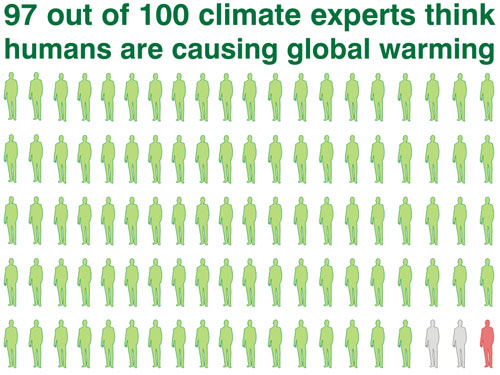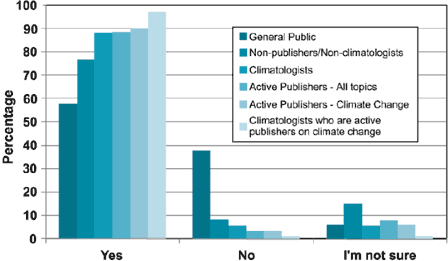Infographic: 97 out of 100 climate experts think humans are causing global warming
Posted on 11 May 2011 by John Cook
I was talking about climate to my dad last week (since the book launch, he will now talk to me about the subject) and I mentioned that 97% of climate scientists are convinced that humans are causing global warming. He registered great surprise at that statistic. "I thought it was more 50/50", he said. It made me realise just how good a job both the mainstream media and the fossil fuel funded disinformation campaign have done in confusing the public about the scientific consensus on global warming. At the same time, I was working on a consensus graphic (cribbed from the Guide to Skepticism) for a video presentation. So as a tool for anyone wishing to communicate the scientific consensus, I've added the following infographic to the Climate Graphics resource:
The 97% figure comes from two independent studies, each employing different methodologies. One study surveyed all climate scientists who have publicly signed declarations supporting or rejecting the consensus (Anderegg 2010). Another study directly asked earth scientists the following question "Do you think human activity is a significant contributing factor in changing mean global temperatures?" They found 97% of actively publishing climate scientists answered yes (Doran 2009). As "climate scientists actively publishing peer-reviewed research on climate change" doesn't really roll off the tongue, I abbreviated that down to "climate experts".
One feature of Doran's survey results is that while 97% of climate expert said "yes, humans are causing global warming", only 1% said "no, we're not". The other 2% were unsure:

Response to the survey question "Do you think human activity is a significant contributing factor in changing mean global temperatures?" (Doran 2009)
I've indicated the "I'm not sure" portion in the "97 out of 100 climate experts" infographic with grey colouring.































 Arguments
Arguments






























[DB] Hot-linked URL.